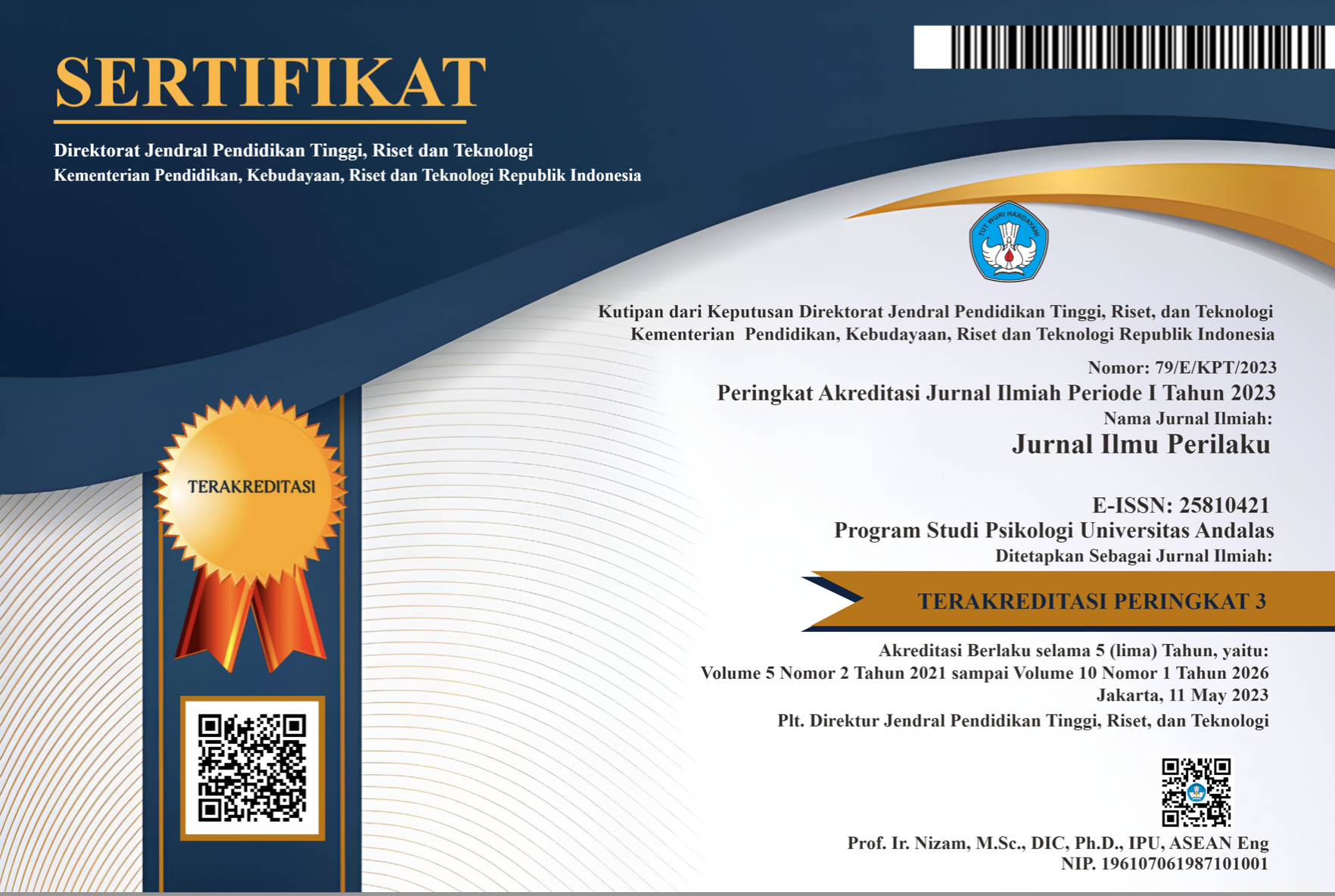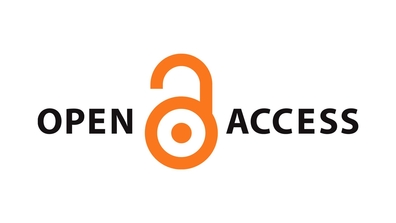Apa yang Menjadikan Remaja Indonesia Bangga Terhadap Bangsanya?
Abstract
A person's pride in his nation is the main pillar to support the existence and sustainability of the country. Young Indonesians growing up in the era of digital democracy tend to develop a distinctive national identity and source of national pride compared to previous generations. Unfortunately, various things which become a source of pride for Indonesian adolescents towards their nation are rarely explored. This study aimed to identify various sources of national pride for adolescents in Indonesia. Around 385 respondents (aged 18 – 21 years), consisting of 313 females and 72 males involved in the study. The data in this study were collected using an open questionnaire containing one question, "What makes you feel proud as an Indonesian citizen?". The questionnaire was distributed on various social media platforms. Data were analyzed using thematic analysis techniques. The results show that Indonesian adolescents are proud of their nation because of the diverse cultures, ethnicities, languages, religions, and cuisines in Indonesia, as well as the rich and beautiful natural resources and the good climate of Indonesia. Furthermore, young Indonesians are also proud of the local people’s quality and characters and the history and struggle of heroes. Various achievements of the Indonesian people have also become a source of pride for Indonesian youths. The findings indicate that the source of Indonesian adolescents' national pride focuses more on the given things than something that the Indonesian people achieve.
Keywords: Adolescents, National Pride, National Identity, Diversity, Indonesian People
Downloads
References
Affan, M. H., & Maksum, H. (2016). Membangun kembali sikap nasionalisme bangsa Indonesia dalam menangkal budaya asing di era globalisasi. Jurnal Pesona Dasar, 3(4), 65–72.
Agustin, Y. (2011). Kedudukan bahasa Inggris sebagai pengantar dalam dunia pendidikan. Deiksis, 3(4), 354–364. https://doi.org/10.31227/osf.io/xdqjg
Al Thani, S. (2017). Globalization and national identity in Qatar: Does exposure to globalization lead to changes in national identity across different generations of Qatari citizens? Qatar University.
Alaby, M. A. (2020). Menumbuhkan kepribadian bangsa yang berkarakter Pancasila. Jurnal Pendidikan Terintegrasi, 1(1), 45–55.
Am, S., & Lestari, A. D. (2017). Sejarah Indonesia. Kementerian Pendidikan dan Kebudayaan.
Ardinastiti, N., Masrukhi, M., & Suhandini, P. (2019). The implementation of multicultural values on vocational high school students (A research at bagimu negeriku vocational high school Semarang). Journal of Educational Social Studies, 8(1), 27–34. https://journal.unnes.ac.id/sju/index.php/jess/article/download/28765/12582
Asfina, R., & Ovilia, R. (2016). Bangga dengan kekayaan warisan budaya Indonesia dan waspada dengan usaha pelestariannya di dunia global. Humanus, 15(2), 195–206.
Avenida, Q. (2019). A Comparative study on Chinese and Indonesian greeting culture in multicultural society. Advances in Social Science, Education and Humanities Research, 338, 217–220. https://doi.org/10.2991/prasasti-19.2019.38
Baydhowi, B., Purwono, U., Siswadi, A. G. P., & Ali, M. M. (2022). Developing national identity scale: As Indonesian case. The Open Psychology Journal, 15, 1–9.
Bitschnau, M., & Muβotter, M. (2022). (National) pride and (conceptual) prejudice: Critical remarks on the distinction between patriotism and nationalism. Journal of Political Ideologies, 1–15. https://doi.org/10.1080/13569317.2022.2096301
Braun, V., & Clarke, V. (2006). Using thematic analysis in psychology. Qualitative Research in Psychology, 3(2), 77–101. https://doi.org/10.1191/1478088706qp063oa
Brewer, P., & Venaik, S. (2011). Individualism-collectivism in Hofstede and globe. Journal of International Business Studies, 42(3), 436–445. https://doi.org/10.1057/jibs.2010.62
Castro, F. G., Stein, J. A., & Bentler, P. M. (2009). Ethnic pride, traditional family values, and acculturation in early cigarette and alcohol use among Latino adolescents. Journal of Primary Prevention, 30(3–4), 265–292. https://doi.org/10.1007/s10935-009-0174-z
Chen, R. (2017). Chinese youth nationalism in a pressure cooker. In Taiwan and China (pp. 93–113). University of California Press. https://doi.org/10.1525/luminos.38.f
Cheng, J. T., Tracy, J. L., & Henrich, J. (2010). Pride, personality, and the evolutionary foundations of human social status. Evolution and Human Behavior, 31(5), 334–347. https://doi.org/10.1016/j.evolhumbehav.2010.02.004
Darwish, A.-F. E., & Huber, G. L. (2003). Individualism vs collectivism in different cultures: A cross-cultural study. Intercultural Education, 14(1), 47–56. https://doi.org/10.1080/1467598032000044647
Ekaprasetya, S. N. A., Dewi, D. A., & Furnamasari, Y. F. (2021). Menumbuhkan jiwa nasionalisme generasi millenial di era globalisasi melalui pancasila. Jurnal Pendidikan Tambusai, 5(3), 7853–7858. https://jptam.org/index.php/jptam/article/view/2256
Evans, M. D. R., & Kelley, J. (2002). National pride in the developed world: Survey data from 24 nations. International Journal of Public Opinion Research, 14(3), 303–338. https://doi.org/10.1093/ijpor/14.3.303
Fabrykant, M., & Magun, V. (2016). Grounded and normative dimensions of national pride in comparative perspective. In Sociology. https://doi.org/10.4324/9781315746111
Fatmawati, E. (2021). Strategies to grow a proud attitude towards Indonesian cultural diversity. Linguistics and Culture Review, 5(S1), 810–820. https://doi.org/10.21744/lingcure.v5ns1.1465
Fitri, A. N., & Adeni, A.-. (2020). Jokowi dan kekuatan pencitraan diri serta relasinya dengan umat islam. Alhadharah: Jurnal Ilmu Dakwah, 19(2), 1–17. https://doi.org/10.18592/alhadharah.v19i2.3503
Ha, S. E., & Jang, S. J. (2015). National identity, national pride, and happiness: The case of South Korea. Social Indicators Research, 121(2), 471–482. https://doi.org/10.1007/s11205-014-0641-7
Hartono, D. (2020). Fenomena kesadaran bela negara di era digital dalam perspektif ketahanan nasional. Jurnal Kajian Lemhannas RI, 8(1), 19.
Herrera, D. R. (2015). The Philippines an overview of the colonial era. Southeast Asia in the Humanities and Social Science Curricula, 20(1), 14–19.
Irmania, E., Trisiana, A., & Salsabila, C. (2021). Upaya mengatasi pengaruh negatif budaya asing terhadap generasi muda di Indonesia. Dinamika Sosial Budaya, 23(1), 148–160.
Khamid, N. (2016). Bahaya radikalisme terhadap NKRI. Millati: Journal of Islamic Studies and Humanities, 1(1), 123. https://doi.org/10.18326/mlt.v1i1.123-152
Khasanah, N., Mashuri, M. F., & Karmiyati, D. (2021). Manifestations of polyculturalism in Indonesia : A study of indigenous psychology. Indigenous: Jurnal Ilmiah Psikologi, 6(2), 1–13.
Kusumawardani, A., & Faturochman, F. (2004). Nasionalisme. Buletin Psikologi, XII(2), 61–72.
Lefa, B. (2014). The piaget theory of cognitive development : An educational implications. Educational Psychology, 1(1), 1–9.
Lestari, J. (2020). Pluralisme agama di Indonesia: Tantangan dan peluang bagi keutuhan bangsa. Al-Adyan: Journal of Religious Studies, 1(1), 29–38. https://doi.org/10.15548/al-adyan.v1i1.1714
Lie, A., Sayoga, J. C. T. T., Parera, F. M., Joesoef, D., Tilaar, H. A. R., Buchori, M., Marianti, S. F., Sularto, S., Darmaningtyas, D., Supratiknya, A., & Widiyanto, T. P. (2008). Pendidikan nasional dalam reformasi politik dan kemasyarakatan. Universitas Sanata Dharma.
Liu, C., Li, J., Chen, C., Wu, H., Yuan, L., & Yu, G. (2021). Individual pride and collective pride: Differences between Chinese and American corpora. Frontiers in Psychology, 12, 1–7. https://doi.org/10.3389/fpsyg.2021.513779
Maguire, M., & Delahunt, B. (2017). Doing a thematic analysis: A practical, step-by-step guide for learning and teaching scholars. All Ireland Journal of Higher Education, 8(3), 3351–33513. https://doi.org/10.1109/TIA.2014.2306979
Manurung, E. S. D., Salsabila, F. I., Wirawan, P. T. P., Anggraini, N. D., Glorino, M., & Pandin, R. (2022). Identity crisis as a threat among Indonesian young generations. Populasi, 30(1), 1–9.
Marinda, L. (2020). Teori perkembangan kognitif Jean Piaget dan problematikanya pada anak usia Sekolah Dasar. An-Nisa’: Jurnal Kajian Perempuan & Keislaman, 13(1), 116–152.
Marlina, E. (2016). Internalisasi nilai-nilai Pancasila dan rasa cinta tanah air pada remaja. Psikoborneo: Jurnal Ilmiah Psikologi, 4(4), 562–567. https://doi.org/10.30872/psikoborneo.v4i4.4244
Marsudi, M., & Zahrok, S. (2015). Kesetiaan berbahasa Indonesia dipertanyakan di era globalisasi. Jurnal Sosial Humaniora, 8(1), 95–105. https://doi.org/10.12962/j24433527.v8i1.1245
Midhio, I. W., Ismadi, A., & Waluyo, A. A. (2017). The impact of radicalism toward national defense. Jurnal Pertahanan, 3(1), 1–14. http://jurnal.idu.ac.id/files/journals/16/articles/145/attachment/145-367-1-AT.pdf
Minardi, A., Taufik, T., Afriantari, R., & Hasanah, N. U. (2020). Indonesian tourism diplomacy to India. Indonesian Journal of Tourism and Leisure, 01(1), 1–13. https://doi.org/10.36256/ijtl.v1i1.83
Moordiningsih, M., Rahardjo, W., Ruhaena, L., Uyun, Z., & Supartini, N. (2021). Indonesian national identity model: The importance of religion, self-esteem, and relations between groups among Muhammadiyah students. Jurnal Psikologi Integratif, 9(2), 150–174.
Mulyana, A. (2013). Potret karakter manusia Indonesia dalam dinamika identitas kebangsaan. Jurnal Pendidikan Sosial & Ekonomi, 2(2), 1–17. https://syekhnurjati.ac.id/jurnal/index.php/edueksos/article/view/916/660
Mummendey, A., Klink, A., & Brown, R. (2001). Nationalism and patriotism: National identification and out-group rejection. British Journal of Social Psychology, 40, 159–172.
Murtasidin, B., & Alfajri, A. (2019). Nasionalisme elit pemuda di Provinsi Riau. Jurnal Dinamika Pemerintahan, 2(1), 1–13. https://doi.org/10.36341/jdp.v2i1.733
Nahak, H. M. . (2019). Upaya melestarikan budaya Indonesia di era globalisasi. Jurnal Sosiologi Nusantara, 5(1), 65–76. https://doi.org/10.33369/jsn.5.1.65-76
Nauly, M., Irmawati, I., Purba, R. M., & Fauzia, R. (2022). The dynamics of ethnic and national identities in the process of becoming an Indonesian: The Bataknese case. Jurnal Psikologi Ulayat, 9(2), 305–331.
Neumann, R., Steinhäuser, N., & Roeder, U. R. (2009). How self-construal shapes emotion: Cultural differences in the feeling of pride. Social Cognition, 27(2), 327–337. https://doi.org/10.1521/soco.2009.27.2.327
Nurhasanah, L., Siburian, B. P., & Fitriana, J. A. (2021). Pengaruh globalisasi terhadap minat generasi muda dalam melestarikan kesenian tradisional Indonesia. Jurnal Global Citizen: Jurnal Ilmiah Kajian Pendidikan Kewarganegaraan, 10(2), 31–39. https://doi.org/10.33061/jgz.v10i2.5616
Oyserman, D., Coon, H. M., & Kemmelmeier, M. (2002). Rethinking individualism and collectivism: Evaluation of theoretical assumptions and meta-analyses. Psychological Bulletin, 128(1), 3–72. https://doi.org/10.1037/0033-2909.128.1.3
Perso, T. (2012). Cultural responsiveness and school education: With particular focus on Australia’s first peoples; A review & synthesis of the literature. Menzies School of Health Research, Centre for Child Development and Education, Darwin Northern Territory.
Priwati, A. R., Putri, A. K., Puri, V. G. S., Ayuningtya, A. A., & Minza, W. M. (2021). Multiculturalism as a mediator of ethnic identity and national identity among Javanese adolescents. Makara Human Behavior Studies in Asia, 25(1), 108–115.
Pu, J. (2022). Patriotism education for teenagers from Chinese villages. A case study in Huayuan No. 3 Middle School, Xiangxi, Hunan. Proceedings of the 2022 6th International Seminar on Education, Management and Social Sciences (ISEMSS 2022), 608–620. https://doi.org/10.2991/978-2-494069-31-2
Purdie, N., & Craven, R. G. (2006). Young people’s perceptions of what it means to be an Australian [R]. Fourth International Biennial SELF Research, University of Michigan, Ann Arbor in 2006. https://research.acer.edu.au/learning_processes/1
Roslidah, N., & Komara, I. (2017). Cultural differences of Indonesian ethnic minorities in non-verbal communication. Jurnal Studi Komunikasi (Indonesian Journal of Communications Studies), 1(1), 6–18. https://doi.org/10.25139/jsk.v1i1.60
Samaiya, A. (2022). Jean Piaget’s cognitive development. The International Journal of Indian Psychology, 10(1), 1510–1513. https://doi.org/10.25215/1001.155
Schmidt, P., & Quandt, M. (2018). National identity, nationalism, and attitudes toward migrants in comparative perspective. International Journal of Comparative Sociology, 59(5–6), 355–361. https://doi.org/10.1177/0020715218816242
Sebayang, E. R. (2020). Mempertahankan identitas nasional di era digital. RANGKIANG: Jurnal Pengabdian Pada Masyarakat, 1(2), 107–110. https://doi.org/10.22202/rangkiang.2019.v1i2.3778
Setianto, Y. (2019). Pendidikan karakter melalui keteladanan pahlawan nasional. Publikasi Pendidikan, 9(2), 177–186. https://doi.org/10.26858/publikan.v9i2.9267
Shi, Y., Chung, J. M., Cheng, J. T., Tracy, J. L., Robins, R. W., Chen, X., & Zheng, Y. (2015). Cross-cultural evidence for the two-facet structure of pride. J Res Pers, 55, 61–74. https://doi.org/10.1016/j.jrp.2015.01.004.Cross-cultural
Smith, T. W., & Kim, S. (2006). National pride in comparative perspective: 1995/96 and 2003/04. International Journal of Public Opinion Research, 18(1), 127–136.
Sukma, B. P. (2021). Constructing and promoting national identity through tourism: A multimodal discourse analysis of Indonesia official tourism website. Linguistik Indonesia, 39(1), 63–77.
Swift, M. (2017). The poet, the peasant and the nation: Aleksandr pushkin’s ‘skazka o pope i o rabotnike ego balde’ (1830) in illustrated editions 1917–1953. Russian Literature, 87–89, 123–146. https://doi.org/10.1016/j.ruslit.2017.04.006
Syarifah, S., & Kusuma, A. (2016). Globalisasi sebagai tantangan identitas nasional bagi mahasiswa Surabaya. Global & Policy, 4(2), 78–91.
Sznycer, D., Al-Shawaf, L., Bereby-Meyer, Y., Curry, O. S., De Smet, D., Ermer, E., Kim, S., Kim, S., Li, N. P., Seal, M. F. L., McClung, J., Jiaqing, O., Ohtsubo, Y., Quillien, T., Schaub, M., Sell, A., Van Leeuwen, F., Cosmides, L., & Tooby, J. (2017). Cross-cultural regularities in the cognitive architecture of pride. Proceedings of the National Academy of Sciences of the United States of America, 114(8), 1874–1879. https://doi.org/10.1073/pnas.1614389114
Tetep, D. (2016). Penanaman nilai-nilai karakter sosial siswa dalam pendidikan kewarganegaraan dan IPS dalam konteks perspektif global. Jurnal Petik, 2(2), 35–46. https://doi.org/10.31980/jpetik.v2i2.72
Trošt, T. P. (2019). Remembering the good : Constructing the nation through joyful memories in school textbooks in the former Yugoslavia. Memory Studies, 12(1), 27–45. https://doi.org/10.1177/1750698018811986
Trucco, D., & Ullmann, H. (2016). Youth: Realities and challenges for achieving development with equality. In Economic Commission for Latin America and the Caribbean (ECLAC).
Vlachová, K. (2019). This country is not for anyone: Explanations of low national pride in the Czech Republic. Nationalities Papers, 47(6), 1000–1012. https://doi.org/10.1017/nps.2018.22
Wagner, U., Becker, J. C., Christ, O., Pettigrew, T. F., & Schmidt, P. (2012). A Longitudinal test of the relation between German nationalism, patriotism, and outgroup derogation. European Sociological Review, 28(3), 319–332. https://doi.org/10.1093/esr/jcq066
Weinreich, P., Bacova, V., & Rougier, N. (2003). Basic primordialism in ethnic and national identity. In P. Weinreich & W. Saunderson (Eds.), Analysing idenity cross-cultural, societal and clinical contecxts (pp. 117–121). Routledge.
Werdiningsih, E. (2018). Memperkokoh bahasa Indonesia sebagai bahasa nasional dan internasional. Likhitaprajna, 18(2), 20–25.
Widiyono, S. (2019). Pengembangan nasionalisme generasi muda di era globalisasi. Jurnal Populika, 7(1), 12–21.
Wishnuwardhani, P. D., & Mangundjaya, W. (2008). Hubungan nilai budaya individualisme-kolektivisme dan gaya penyelesaian konflik. Jurnal Psikologi Sosial, 14(1), 1–8.
Zitierung, E., Castillo, J. M., Fario, C. G., Trinidad, J. A., & Bernarte, R. P. (2016). National pride of the Filipino youth. Asia Pacific Journal of Multidisciplinary Research, 4(3), 18–25.
The non-commercial use of the article is governed by the Creative Commons Attribution license as currently displayed on Creative Commons Attribution-NonCommercial-ShareAlike 4.0 International License.
JIP's spirit is to disseminate articles published are as free as possible. Under the Creative Commons license, JIP permits users to copy, distribute, display, and perform the work for non-commercial purposes only. Users will also need to attribute authors and JIP on distributing works in the journal.
Please find the rights and licenses in Jurnal Ilmu Perilaku (JIP).
- License
The non-commercial use of the article will be governed by the Creative Commons Attribution license as currently displayed on Creative Commons Attribution-NonCommercial-ShareAlike 4.0 International License.
- Author’s Warranties
The author warrants that the article is original, written by stated author(s), has not been published before, contains no unlawful statements, does not infringe the rights of others, is subject to copyright that is vested exclusively in the author and free of any third party rights, and that any necessary written permissions to quote from other sources have been obtained by the author(s).
- User Rights
JIP's spirit is to disseminate articles published are as free as possible. Under the Creative Commons license, JIP permits users to copy, distribute, display, and perform the work for non-commercial purposes only. Users will also need to attribute authors and JIP on distributing works in the journal.
- Rights of Authors
Authors retain the following rights:
- Copyright, and other proprietary rights relating to the article, such as patent rights,
- The right to use the substance of the article in future own works, including lectures and books,
- The right to reproduce the article for own purposes, provided the copies are not offered for sale,
- The right to self-archive the article.
- Co-Authorship
If the article was jointly prepared by other authors, the signatory of this form warrants that he/she has been authorized by all co-authors to sign this agreement on their behalf, and agrees to inform his/her co-authors of the terms of this agreement.
- Termination
This agreement can be terminated by the author or JIP upon two months’ notice where the other party has materially breached this agreement and failed to remedy such breach within a month of being given the terminating party’s notice requesting such breach to be remedied. No breach or violation of this agreement will cause this agreement or any license granted in it to terminate automatically or affect the definition of JIP.
- Royalties
This agreement entitles the author to no royalties or other fees. To such extent as legally permissible, the author waives his or her right to collect royalties relative to the article in respect of any use of the article by JIP or its sublicensee.
- Miscellaneous
JIP will publish the article (or have it published) in the journal if the article’s editorial process is successfully completed and JIP or its sublicensee has become obligated to have the article published. JIP may conform the article to a style of punctuation, spelling, capitalization, referencing and usage that it deems appropriate. The author acknowledges that the article may be published so that it will be publicly accessible and such access will be free of charge for the readers.










